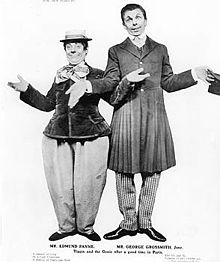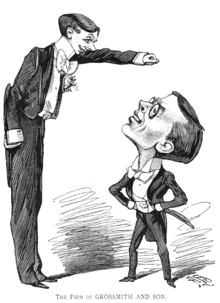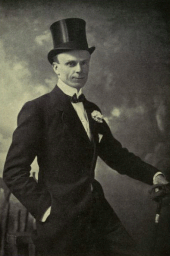George Grossmith Jr.
George Grossmith Jr. | |
|---|---|
 Grossmith (right), with Edmund Payne in 1907 | |
| Born | 11 May 1874 Haverstock Hill, London, England |
| Died | 6 June 1935 (aged 61) Haverstock Hill, London, England |
| Occupation(s) | Theatrical producer, actor, playwright and songwriter |
| Spouse | Adelaide Astor |
| Parent(s) | George Grossmith and Emmeline Rosa Noyce |
George Grossmith Jr. (11 May 1874 – 6 June 1935) was an English actor, theatre producer and
Grossmith soon became an audience favourite playing "dude" roles. Early appearances in musicals included
Grossmith established himself as a major producer, together with
Later, he performed in such pieces as Princess Charming (1926) and appeared in at least ten films for London Film Productions Ltd., among other films, in the 1930s. He produced The Land of Smiles and Cavalcade (both in 1931), and in 1933, he played Touchstone in a production of As You Like It.
Life and career

George Grossmith was born in Haverstock Hill, London, the eldest son of the writer and Gilbert and Sullivan star George Grossmith, and his mother was Emmeline Rosa, née Noyce. His grandfather was also named "George Grossmith", and even though he was the third George Grossmith, he was credited on stage as "George Grossmith Jnr". His brother was the actor Lawrence Grossmith.
Grossmith studied at
Grossmith was known for "speaking" songs and for his easy comic grace on stage.[2] He was tall and gangling, with a "face hardly less extraordinary than his curious legs and a humour as unctuous as his father's at his best."[3]
Early career
Grossmith's first role in a musical was at the age of 18 in a small comic role in his father's collaboration with W. S. Gilbert, Haste to the Wedding. He next appeared in several small comic roles, including in The Baroness (1892).
Grossmith's breakthrough came in
Grossmith left the musical stage for about three years, appearing in straight comedies, but he returned in 1898 to take over in the musical Little Miss Nobody and then as Mark Antony in the burlesque, Great Caesar (1899), which Grossmith had written with

Grossmith then returned to Edwardes's company as leading comedian, touring in Kitty Grey, and then starred in the
Grossmith co-wrote the successful
Peak producing years
In 1913, Grossmith starred in
Back at the Gaiety Theatre, Grossmith wrote, produced and starred in the hit Theodore & Co (1916), based on a French comedy. Edwardes had died in 1915, however, and Grossmith was dissatisfied with the offer of the new management under Alfred Butt and Robert Evett, the executor of Edwardes's estate, and so he left the Gaiety and produced three successes, Mr Manhattan, Arlette (1917), and Yes, Uncle! (1917) elsewhere. His Oh! Joy (the British adaptation of Oh, Boy!, 1917) was also successful. He also wrote the tremendously successful revue series, The Bing Boys Are Here (1916), The Bing Girls are There (1917) and The Bing Boys on Broadway (1918).[4] Grossmith fitted his work on all these productions around his naval service in World War I.
Grossmith and Laurillard built their own theatre, the
Grossmith partnered with Edwardes's former associate, J. A. E. Malone, to produce a series of mostly adaptations of imported shows at the Winter Garden from 1921 to 1926:[4] Sally (1921), The Cabaret Girl (1922, with book by Wodehouse and music by Jerome Kern), The Beauty Prize (1923, with Wodehouse and Kern), a revival of Tonight's the Night (1923), Primrose (1924, with music by George Gershwin), Tell Me More (1925, with words by Thompson and music by George Gershwin)[12] and Kid Boots (1926 with music by Harry Tierney),[13] many of them featuring Leslie Henson. Grossmith co-wrote some of the Winter Garden pieces, directed many of his own productions and starred in several, notably as Otis in Sally. Several of the later productions lost money, and Grossmith and Malone ended the partnership.[1]
Grossmith also co-produced

In their joint memoir
"Must I sing, Mr Grossmith?"
"Yes, Sylvia, you must. All of you have to sing if you want jobs as showgirls in Primrose. The Gershwin score demands it."
"Oh very well," she replied petulantly, and, going down to the floats she handed over a piece of music to the pianist in the pit. The piano struck a chord.
- "God save our gracious King,
- Long live our noble King,
- God save the King."
Grossmith, a strict observer of ritual, rose and stood at attention. His minions rose and stood at attention. Guy, on his way to announce his arrival, stood at attention. As the anthem came to the normal stopping point, George started to sit down, but there is more, much more of the fine old chorale than is generally known. James Carey is credited with a three-stanza version; in another version
knighthood.[16]
Later years and legacy

After 1926, Grossmith stopped producing, but he continued to perform, playing King Christian in Albert Szirmai's Princess Charming (1926) for producer Robert Courtneidge in New York, and Britain in The Five o'Clock Girl and Lady Mary (1928). In New York in 1930, and later in London (where it flopped), he starred in Ralph Benatzky's My Sister and I (aka Meet My Sister). He also appeared in at least ten films for London Films in the 1930s.[1] During a brief sojourn in Hollywood, he appeared in several films produced at the Fox Studios, including Women Everywhere (1930), for which he also supplied the story, and Are You There? (1930).[17]
In 1931–32, Grossmith was appointed managing director of the
According to musical theatre writer Andrew Lamb, Grossmith
- played a particular part in introducing American songs and American musical shows into the British musical theatre. It was George Grossmith Jr., who danced the cakewalk in The Toreador in 1901, who as lyricist and performer gave Jerome Kern an entree into the London theater in 1906, and who introduced "They Didn't Believe Me" to London in To-Night's the Night... (1915). It was he who co-authored those Empire and Alhambra revues that introduced ragtime song to London and he, too, who, as coproducer, gave Kern his first joint composer billing in London with Theodore & Co. in 1916, presented Oh, Joy! in 1919, and commissioned The Cabaret Girl and The Beauty Prize from Kern and Primrose from Gershwin. And, finally, it was he who made one of his last appearances in that London production of No, No, Nanette that preceded the New York opening.[19]
The Wodehouse scholar Norman Murphy believes that Grossmith was the inspiration for Bertie Wooster.[20]
Grossmith died in a London nursing home at the age of 61.[2][21] He never received his promised knighthood.[4]
Filmography

- As an actor
- A Gaiety Duet (1909) .... Honourable Hugh
- The Argentine Tango and Other Dances (1913)
- Women Everywhere (1930) .... Aristide Brown
- Those Three French Girls (1930) .... Earl of Ippleton
- Are You There? (1930) .... Duke of St. Pancras (aka Exit Laughing (USA))
- Service for Ladies (1932) .... Mr. Westlake (aka Reserved for Ladies (USA))
- Wedding Rehearsal (1932) .... Earl of Stokeshire
- The Man with the Hispano (1933) (as Georges Grossmith) .... Lord Oswill (aka The Man in the Hispano-Suiza (USA))
- L'Épervier (1933) .... Erik Drakton (aka Amoureux, Les (France))
- The Girl from Maxim's (1933) .... The general
- The Lady of Lebanon (1934) .... Le colonel Hobson
- Princess Charming (1934) .... King of Aufland
- As composer
- Women Everywhere (1930) (lyrics: "All the Family")
- As screenwriter
- Women Everywhere (1930) (story)
- Wedding Rehearsal (1932) (story)
Notes
- ^ a b c d e Gänzl, Kurt. "Grossmith, George (1874–1935)" in the Oxford Dictionary of National Biography, Oxford University Press (2004) retrieved 21 Oct 2007
- ^ a b c d e Obituary in The Times, 7 June 1935; p. 9
- ^ Hicks, Seymour Hicks: Twenty-Four Years of an Actor's Life (1910), p. 188
- ^ a b c d e f g h Berger, Leon. "Grossmith, George Jr.", The New Grove Dictionary of Music and Musicians, Oxford University Press (2nd edition, 2001)
- ^ Cruickshank, Graeme. "The Life and Loves of Letty Lind" in The Gaiety, Issue 22, Summer 2007
- ISBN 9780306801136.
- ^ The Times, 12 November 1900, p. 13, col. G
- ^ He joined the Green Room Lodge No. 2957 on 6 April 1904, an actors' lodge which included Leedham Bantock, Fred Terry and Gerald du Maurier among its members. See George Grossmith Jr., United Grand Lodge of England Freemason Membership Registers, 1751–1921, Ancestry.com (subscription required)
- ^ "English Actors Arrive" (PDF). The New York Times. 13 December 1914. p. 14. Retrieved 9 August 2008.
George Grossmith heads company...
- ^ Howarth, Paul. "To-Night's the Night", American Musical Theatre pages at the Gilbert and Sullivan Archive, 15 April 2017, retrieved 5 July 2020
- ^ Apollo Theatre Archived 13 April 2010 at the Wayback Machine. Click History tab for information about Grossmith's management of the theatre. Retrieved 15 April 2010
- ^ Tell Me More review in The Times, 27 May 1925, p. 14
- ^ Kid Boots review in The Times 3 February 1926, p. 12
- ^ Eastward Ho! review in The Times, 10 September 1919, p. 8
- ^ "Grossmith, George 1925 article, "Radio the Rival," written as Programme Advisor to the BBC". Archived from the original on 15 July 2011. Retrieved 27 October 2007.
- Bring on the Girls!(1953), Chapter 13, section 3
- ^ Kingsley, Grace (14 January 1930). "Fox Signs George Grossmith". Los Angeles Times. Retrieved 6 June 2010.
- ^ The Times, 20 June 1933, p. 14
- ^ Lamb, Andrew. "From Pinafore to Porter: United States-United Kingdom Interactions in Musical Theater, 1879–1929", American Music, Vol. 4, No. 1, British-American Musical Interactions (Spring, 1986), pp. 34–49, University of Illinois Press, retrieved 18 September 2008
- ^ Hastings, Chris and Beth Jones. "The real-life Jeeves, Wooster and master of Blandings Castle finally unmasked", The Sunday Telegraph, 6 January 2008
- ^ "George Grossmith, British Actor, Dies". The New York Times. 7 June 1935. p. 25. Retrieved 6 June 2010.
References
- Gänzl, Kurt. The British Musical Theatre (Macmillan Press, 1986)
- Gänzl, Kurt. The Encyclopedia of the Musical Theatre (2nd ed., 2001, Schirmer)
- Grossmith, George (1933). GG. London: Hutchinson.
- Naylor, S (1913). Gaiety and George Grossmith. London: Stanley Paul.
External links
- Biography of Grossmith
- George Grossmith Jr. at the Internet Broadway Database
- George Grossmith Jr. at IMDb
- Information about Grossmith credits
- Audio clip of Grossmith singing "Murders" on YouTube from To-Night's the Night(1914)
- Plays by George Grossmith at Great War Theatre
